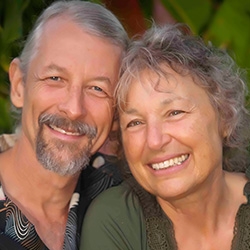
NVC Resources on Responsibility
-
What is essential to make a relationship thrive? Listen to CNVC Certified Trainer Mukti Jarvis share seven types of conversations vital to healthy, flourishing intimate relationships.
-
Here we explore variants of conflict patterns in part two (of this two part series) that include: refuting "straw man arguments"; not checking understanding, repeating unhelpful behaviour; repeatedly asking for what's already given; asserting rather than demonstrating responsiveness; assumptions; denying conflict exists; neglecting interdependence; stonewalling; absence of curiosity, humility, respect, empathy or care (even when reflecting).
-
Ask the Trainer: "What guidance do you have for working with enemy images? Can you say some things about processes and/or exercises that can bring relief from this trap?"
-
Join veteran Mediators and Facilitators, Jori and Jim Manske in using Nonviolent Communication and mediation skills for transforming conflict into connection between yourself and others.
-
Trainer Tip: Sometimes the people in our lives don’t yet have the skills to speak directly about what they want. When this happens we can make guesses about how they feel and what they want. This can lead to greater connection and chances we all can be more satisfied with our interactions.
-
Much like other asymmetric relationships (such as therapist and client), there are complications related to power dynamics that can arise with any NVC trainer having sex with a participant. For one, there's (counter)transference. And there's potential for things that may not move outside this asymmetric relationship -- such as projections where the participant, and/or the trainer, is guided by un-healed pain of their "inner child".
-
CNVC Certified Trainer, Yoram Mosenzon has a vision… he sees mediation as a basic life skill that could be taught in schools starting at the age of three. He dreams of a world where all human beings have mediation skills to support understanding, cooperation, and connection when conflicts arise.
-
Join Linda Mia Mukte (formerly Rysenbry), CNVC Certified Trainer, for this uniquely powerful telecourse recording that blends NVC with Dr. Sue Johnson’s empirically validated work on adult love relationships called EFCT: Emotionally Focused Couples Therapy.
-
Learn to speak NVC using your own voice and increase ease and flow in all your personal and professional conversations. This 7-session telecourse recording with renowned trainer Miki Kashtan is designed to help you integrate NVC into all aspects of your life by gaining fluency in your practice of NVC and by embodying the principles regardless of the words you use. This course is based on intensive practice and coaching with real-life examples from participants’ lives.
-
Is there someone you wish was more willing? Try guessing what obstacles they might be struggling with. And allow yourself to feel your grief. As you grapple with your own desire for someone to find their willingness, its essential to recognize that this is about you and your needs. You can also express your needs honestly, make requests for how to collaborate, and be responsive to what they want. Read on for more on this, plus four common ways someone’s willingness might be blocked.











